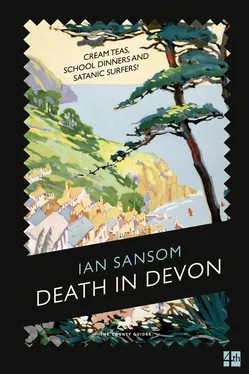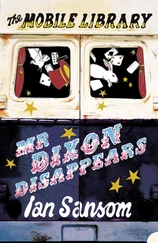‘You might say that.’
‘So Dr Standish would be aware of your activities?’
‘Standish knows all about me. And we know all about him.’
‘Good,’ I said, not entirely reassured, but wishing to be in conversation with this odd young fellow no longer. ‘Well, I’m just unloading the car here …’
He had already turned and walked away.
The contents of the Lagonda eventually unloaded into the school entrance hall, I separated my own travelling items from Miriam’s and Morley’s and picked up the Leica, fancying that I might perhaps take some photographs of the buildings. But as I was about to do so a loud gong sounded, summoning the teachers to dinner. As they flooded through the hall I found myself caught up among them as they trooped towards the dining room. Alex, walking alongside Miriam, spotted me with the camera and paused on his way past.
‘Camera fiend are we, Mr Sefton?’
‘I just take a few photographs,’ I explained. ‘For Mr Morley’s books.’
‘I’m a keen photographer myself. We have a modest little darkroom down in the basement if you’d like to see it some time.’
‘Tomorrow perhaps.’
‘I think you’ll be impressed,’ he said confidingly. ‘I think we may have many interests in common, Mr Sefton.’ And then he swept Miriam before him into dinner.

CHAPTER 6
RECOMMENDATIONS OF WHERE TO VISIT
WE ENTERED A VAST HALL and shuffled up onto a dais, around a long oak refectory table that bore the scars of age and half a dozen wax-encrusted candelabras. The hall was suffering from a split personality: it was a room divided among itself. Below and beneath the grand oak refectory table on its dais, set at right angles, were rows of rough pine trestles and cheap steel chairs, clearly of an inferior kind. The walls sported crude brown-painted wainscoting below, but vast swathes of old William Morris paper above. There were enough fireplaces to be able to warm the place on the coldest of evenings, and a scattering of three-bar electric fires which might do no better than warm the feet. Exquisite crockery and cutlery were laid on our table, along with battered enamelware jugs and chipped, thick glass tumblers. The unmistakable sweet smell of wax and polish: and the underlying stench of sweat and cabbages. All the usual contradictions, in other words, of the English public school.
Mr Woland Bernhard and his excellent and idiomatic English
I found myself next to the maths master, a Mr Woland Bernhard, who was possessed of boyish good looks and tremendous enthusiasm. He was also German: ‘But not of the bad kind!’ he was quick to point out. He spoke, of course, excellent and idiomatic English. ‘Yes, yes,’ he insisted, when I gestured to take the space next to him, ‘take a pew, take a pew.’ Before we had a chance to take our proverbial pews, the headmaster spoke.
‘Ladies and gentlemen, we are privileged to have with us this evening my dear friend Mr Swanton Morley, known to many of you no doubt as the People’s Professor. One might say that Mr Morley is in the same business as us here at All Souls: the education of the ignorant and the—’
‘Ineducable,’ quipped one of the teachers, to the delight of many of the others.
‘Thank you, Mr Jones,’ said the headmaster. ‘As you know, I invited Mr Morley here to give tomorrow’s Founder’s Day address’ – there was some mumbling and grunting around the table at this, I couldn’t tell whether in approval or disgust – ‘our very first Founder’s Day at our magnificent new location here at Rousdon. I wonder if Mr Morley might like to say the grace for us?’
There was no need to ask: never one to miss an occasion for preaching or performance, Morley ceremonially bowed his head, took a deep breath, and delivered a faultless grace. In Latin, naturally:
Exhiliarator omnium Christe
Sine quo nihil suave, nihil jucundum est:
Benedic, quaesumus, cibo et potui servorum tuorum ,
Quae jam ad alimoniam corporis apparavisti;
et concede ut istis muneribus tuis ad laudem tuam utamur
gratisque animis fruamur;
utque quemadmodum corpus nostrum cibis corporalibus fovetur ,
ita mens nostra spirituali verbi tui nutrimento pascatur
Per te Dominum nostrum.
‘Very good,’ said my mathematician friend, settling into his chair. ‘A classicist, your friend?’
‘Of a kind,’ I agreed. Morley’s stock of Latin tags, sayings and graces was seemingly inexhaustible, though his precise grasp of the grammar of any language other than English was, according to some critics, rather uncertain. He did not believe, for example, in what he called ‘traditional grammar’, propounding instead what he called a ‘theoretical grammar’, which he thought applied to all languages equally. This meant that he spoke Spanish as if it were English, and French as if it were German. He was also extremely disparaging of anything resembling what he called ‘punctuational patriotism’, insisting at all times on using only the very simplest of punctuation marks: he despised my frequent recourse to colons and dashes, which he felt were entirely unnecessary and a barrier to world peace and understanding. His ideas on the subject – which can be found in Morley’s Modern Multilinguist (1928) – had been formed through his correspondence with Mr Ludwik Zamenhof, the creator of Esperanto, and a man who Morley regarded as a kind of secular saint.
‘Now, do tell me, what do you think of our new school, Mr Sefton?’ asked my new German friend, whose manners and whose grammar were both impeccable.
‘It is quite lovely,’ I said, not untruthfully, ‘what I’ve seen of it.’
‘Yes,’ he agreed, cracking open a starched but rather stained napkin and tucking it into his shirt collar. ‘You are correct. It is lovely. And tomorrow you will enjoy also the farm and the dairy and the pumping house. You may know we also have a bowling alley, for the boys, and a rifle range. Tennis courts. And our own little observatory.’
‘Really?’ I said, not paying much attention to him. I was too busy watching Miriam across the table: she was busy flirting with Alexander.
‘We have everything we need here. It is our own little community.’
‘Very good,’ I said.
‘And Dr Standish is our leader,’ he added.
‘Yes.’
‘An excellent headmaster,’ he said. ‘Despite what some people say.’
‘I see.’ Parts of this conversation I must admit I missed entirely.
‘A headmaster must exert total control over a school. Otherwise …’
His ‘otherwise’ trailed off rather, at the very moment at which plates of soup were set before us, and I looked away from the playful Miriam and Alexander and returned my attention to my mathematical friend.
‘Sorry? You were saying?’
‘Otherwise …’
‘Uh-huh. “Otherwise”?’
‘Otherwise? Well. A good leader must be feared and respected,’ said my friend, factually. Perhaps because of his accent, or perhaps because I hadn’t been listening closely to what he was saying, I wasn’t entirely sure if he was referring to the school or to a nation. ‘But. A glass of our modest vin de table , Mr Sefton?’
‘Thank you,’ I said.
He poured and we shared a toast.
‘To knowledge!’ he said.
‘Indeed.’
‘Now, eat!’ he said.
I had a bellyful of People’s Mints and a day of Morley behind me. I did not argue.
Dishes were served and conversations undertaken. At the head of the table, deep in reminiscence, Morley and the headmaster carried on like long-lost brothers. The meal itself was a curious affair. Dr Standish was apparently a recent convert to the cause of vegetarianism, and was determined that all meals in the new school were to be prepared with ingredients from their own farm. Setting the example, he dined, therefore, on a small dish of carrots and a bowl of new potatoes that looked particularly dull and surly – grey-brown, speckled, about the size of bantam eggs, and rather few in number. For the rest of us, however, there were plates of steak, grilled lamb and whole chickens, fresh bread and pats of butter the size of cricket balls: a veritable feast.
Читать дальше













